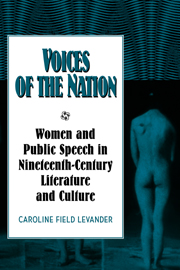Book contents
- Frontmatter
- Contents
- Acknowledgments
- Introduction: Gender, Speech, and Nineteenth-Century American Life
- 1 Bawdy Talk: The Politics of Women's Public Speech in Henry James's The Bostonians and Sarah J. Hale's The Lecturess
- 2 “Foul-Mouthed Women”: Disembodiment and Public Discourse in Herman Melville's Pierre and E. D. E. N. Southworth's The Fatal Marriage
- 3 Incarnate Words: Nativism, Nationalism, and the Female Body in Maria Monk's Awful Disclosures
- 4 Southern Oratory and the Slavery Debate in Caroline Lee Hentz's The Planter's Northern Bride and Harriet Jacobs's Incidents in the Life of a Slave Girl
- 5 Partners in Speech: Reforming Labor, Class, and the Working Woman's Body in Elizabeth Stuart Phelps's The Silent Partner
- 6 “Queer Trimmings”: Dressing, Cross-dressing, and Woman's Suffrage in Lillie Devereux Blake's Fettered for Life
- Conclusion: Women and Political Activism at the Turn into the Twentieth Century
- Notes
- Select Bibliography
- Index
- CAMBRIDGE STUDIES IN AMERICAN LITERATURE AND CULTURE
1 - Bawdy Talk: The Politics of Women's Public Speech in Henry James's The Bostonians and Sarah J. Hale's The Lecturess
Published online by Cambridge University Press: 27 October 2009
- Frontmatter
- Contents
- Acknowledgments
- Introduction: Gender, Speech, and Nineteenth-Century American Life
- 1 Bawdy Talk: The Politics of Women's Public Speech in Henry James's The Bostonians and Sarah J. Hale's The Lecturess
- 2 “Foul-Mouthed Women”: Disembodiment and Public Discourse in Herman Melville's Pierre and E. D. E. N. Southworth's The Fatal Marriage
- 3 Incarnate Words: Nativism, Nationalism, and the Female Body in Maria Monk's Awful Disclosures
- 4 Southern Oratory and the Slavery Debate in Caroline Lee Hentz's The Planter's Northern Bride and Harriet Jacobs's Incidents in the Life of a Slave Girl
- 5 Partners in Speech: Reforming Labor, Class, and the Working Woman's Body in Elizabeth Stuart Phelps's The Silent Partner
- 6 “Queer Trimmings”: Dressing, Cross-dressing, and Woman's Suffrage in Lillie Devereux Blake's Fettered for Life
- Conclusion: Women and Political Activism at the Turn into the Twentieth Century
- Notes
- Select Bibliography
- Index
- CAMBRIDGE STUDIES IN AMERICAN LITERATURE AND CULTURE
Summary
In an 1813 letter to grammarian John Waldo, Thomas Jefferson wrote that in the United States “the new circumstances under which we are placed, call for new words, new phrases, and for the transfer of old words to new objects.” Jefferson's comment has come to epitomize, for scholars of American linguistic and political reform, the links between the two. As Cynthia Jordan notes, antebellum “authors' views on language were tied in with their views on sociopolitical leadership.” Kenneth Cmiel likewise traces in public speakers' move from “aristocratic” to middling, or “common,” rhetoric the changing political atmosphere of mid-nineteenth-century America.
Central to political reform projects throughout the nineteenth century was the assertion, among both linguists and politicians, that politics and public language were unequivocally male prerogatives. The abiding links between masculinity, public language, and political influence were forged, according to Jordan, at the earliest moment of American national identity and resolved one of the first problems facing the nation's statesmen: “The problem confronting the founding generation … was how to devise a system of sociopolitical leadership capable of securing popular acceptance, and the solution they envisioned was the creation and maintenance of a male educated elite that could use language as a means of social and psychological control” (18). Though this model never held uncontested sway over American audiences, by the nineteenth century escalating challenges to these elite men's authority compelled them, as Cmiel notes, to modify their rhetorical practices dramatically, identifying increasingly with their audience rather than preaching to it, in order to maintain their control.
- Type
- Chapter
- Information
- Voices of the NationWomen and Public Speech in Nineteenth-Century American Literature and Culture, pp. 12 - 34Publisher: Cambridge University PressPrint publication year: 1998



